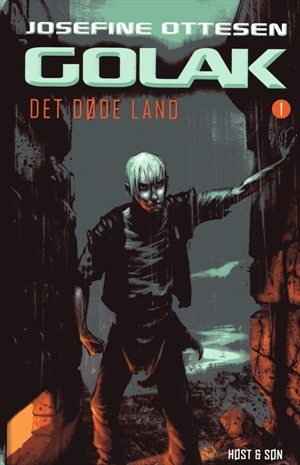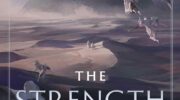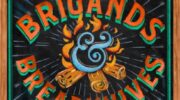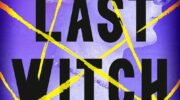Golak by Josefine Ottesen
E-book Edition, Translation by Martin Aitken
Published 2013 by Josefine Ottesen
Review copy provided by author.
Review by N. E. White.
 Golak is Part 1 of The Deadlands Trilogy, a story set in a post-apocalyptic near-future society reeling from a collapse due to ecological, scientific, and political catastrophes. Our main character is Jonah, a young man on the cusp of becoming an adult who fights every rule set before him by his elders. Living in a small, enclosed, god-fearing and sheltered community, this breeds trouble for Jonah and his family.
Golak is Part 1 of The Deadlands Trilogy, a story set in a post-apocalyptic near-future society reeling from a collapse due to ecological, scientific, and political catastrophes. Our main character is Jonah, a young man on the cusp of becoming an adult who fights every rule set before him by his elders. Living in a small, enclosed, god-fearing and sheltered community, this breeds trouble for Jonah and his family.
The story begins with an attack on their village. The golaks, the result of terrible genetic experiments, approach the village walls pleading for food and help. The villagers, along with Jonah and his brother, attack the golaks, driving them off.
In the process, Jonah kills two of the golaks who look a lot like a woman and child instead of the monsters he expected. After the ordeal, once everyone is safe behind the village walls, they realize Jonah’s younger sister, outside the walls grazing her cow, has been taken by the fleeing golaks.
A search party is organized, including Jonah, his estranged brother, and another village boy who is slated to marry Jonah’s sister. They scour the nearby woods, but do not find her. Jonah is convinced if they just keep at the golak’s trail, they’ll find her. Jonah loves his sister and will do anything to save her, but the elders in the search party determine it is too late. The girl is lost. They order that everyone turn back before it gets too dark.
Against their wishes, Jonah and the other village boy run off in the night to hunt the golaks and determine where they are. Early the next morning, they find them in a cave, but there is no way he and his friend can hope to enter their lair and/or fight off the golaks, who are described as, basically, ugly neandertals.
After a long day waiting for the golaks to go back into their cave, Jonah and his friend rush back to the village for reinforcements. Again, a group is organized but Jonah is not allowed to go. For his initial disobedience, he is told he can not go and so he waits.
The party returns, but everyone who had gone are terribly affected by what they have seen and though they have Jonah’s sister’s body, she has been beaten and tortured. She is not the same person and she clings to her betrothed, barely able to function.
The story continues with a devastating turn of events that will scar Jonah for the rest of his life. And throughout his sister’s recovery, Jonah’s mind is reaching for answers about himself and the world around him. Answers that no one will give him.
The society he lives in is based on fear, secrets, and the suppression of knowledge. All things Jonah continually butts his head against while he searches to help his sister and the village. This long, searching story ends with a series of disturbing and horrific revelations about who Jonah is and what he will become.
The author is a seasoned writer in Denmark. Though I read a translation, it is clear that Ms. Josefine Ottesen knows how to draw out the most emotion out of a scene. Many times I found myself on the verge of tears and a few times I shut down my Nook, angry with a decision Jonah’s father made or furious over the self-imposed impotence of his mother. Ms. Ottesen knows about secrets and the harm they can do and she yielded that idea to its fullest in her book. And for a young adult book, I was so happy to see the adults in the book portrayed as flawed (oh, deeply flawed in this case) characters rather than used as stupid props to push our hero’s story along.
Despite all this book has going for it and even though I managed to finish this lengthy novel, in the end, I found this book most off-putting.
Incest and inappropriate sexual relations run amok in the town, as does the male-dominated culture that determines not only behavior but marriages, often favoring the men. Women have self-regulated themselves to willing sub-participants in a patriarchal society. In addition, they use religion in its most controlling form to proliferate fear and ignorance. If that’s not enough to leave a very bad smear on your brain, there’s poor Jonah’s fate that will leave you truly horrified.
 In my opinion, the story’s greatest failing is all the waffling. Boy, does this boy waffle.
In my opinion, the story’s greatest failing is all the waffling. Boy, does this boy waffle.
Does he follow his heart and mind, learn new things and improve the village as best as he can, or does he follow the orders from his elders, do as he is told and show no individuality or special knowledge?
Jonah struggles with these questions for the entire book. One day he exalts in learning new things and the next he is self-admonishing himself to be more like those around him. He is a perpetual pendulum and at times during the story’s narrative, I got confused as to whether he was in his manic I-can-do-anything-phase or his depressed I-must-do-what-I-am-told-phase. In fact, I think even the author got confused somewhere in the middle of the novel.
Regardless, the author does do a good job of making us feel how hard and terrible the young man feels about himself and his place in the world. I felt his anguish and was truly sorry for him (and especially his sister). I wanted the boy to rail against his elders and his family for demanding that he be anything but himself.
In the end, however, someone else makes that decision for him.
In a fit an anger over the loss of something special to him, he strikes out, sealing his fate as an outsider. I was very disappointed that Jonah didn’t come to the conclusion to leave on his own, but rather it was thrust upon him by the actions of others, and his uncontrolled reaction to that action. I guess, that’s true to life, but I had wanted it to be his decision to leave that repressive society and not a default condition based on an irreversible action.
Coupled with the fact that it took an incredible amount of words to get to that point, this is a book that did not leave me wanting more of Jonah’s story, even though I think it is a story worth telling.
N.E. White, February 2014.
Copyright © sffworld.com. If quoted, please credit “sffworld.com, name of reviewer”.




